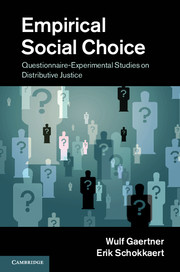2 - Empirical social choice
why and how?
Published online by Cambridge University Press: 05 January 2012
Summary
As described in Chapter 1, there are two strands in the literature on distributive justice: one descriptive, the other normative. The existence of these two strands as such does not raise a real intellectual challenge. Indeed, one could keep to the traditional Humean distinction and simply accept that they tackle two basically different but potentially interesting questions. The first question is positive: what are the feelings and attitudes in society with respect to distributive justice, and how are these linked to the individual and social characteristics of the respondents? The other one is ethical: which arguments are valid for defining a ‘just’ situation or a ‘just’ society? In this dichotomic view, the two approaches can (and should) remain completely separate. Ethical theories are usually much more subtle and complex than everyday opinions and the former can therefore be very misleading as a guide to the latter. There is a real danger that a survey based on these ethical theories would be far removed from any relevant psychological reality of lay citizens. On the other hand, a specific perspective on distributive justice does not become ethically acceptable just because it is supported by a majority of the population. Therefore, in this dichotomic view, positive and normative approaches can easily co-exist. A real challenge only arises if one goes beyond the dichotomy and argues that the descriptive and the normative approach cannot only co-exist, but are complementary and mutually enriching. One then has to show either that ethical theories can be helpful for the empirical work, or that the empirical results can be useful for ethical reasoning, or both.
The challenge is real for ‘empirical social choice’. Social choice makes use of an axiomatic approach to define ethically attractive solutions to situations in which there is a distributional conflict or a trade-off between equity and efficiency. The approach is aptly summarized by Luce and Raiffa (1957, p. 121), as follows:
Rather than dream up a multitude of arbitration schemes and determine whether or not each withstands the best of plausibility in a host of special cases, let us invert the procedure. Let us examine our subjective intuition of fairness and formulate this as a set of precise desiderata that any acceptable arbitration scheme must fulfil. Once these desiderata are formalized as axioms, then the problem is reduced to a mathematical investigation of the existence of and characterization of arbitration schemes which satisfy the axioms.
The last part of the quote seems to suggest that social choice is no more than a purely formal exercise. Indeed, some theorists have taken the position that its main purpose is simply to explore the logical relationships between the various axioms, rather than discussing their normative implications (Maniquet, 1999). However, in a broader interpretation (which, we feel, is supported by the largest part of the profession), the purpose of axiomatic social choice is precisely normative, i.e. to determine which schemes are unfair and which are ethically acceptable. Luce and Raiffa (1957, p. 123) continue:
By means of a (small) finite number of axioms, we are able to ‘examine’ the infinity of possible schemes, to throw away those which are unfair, and to characterize those which are acceptable. The only alternative – to examine in detail each of the infinity of schemes for each of the infinity of possible conflicts it is supposed to arbitrate – is not practical [our italics].
The power of the axiomatic approach resides precisely in the possibility of separating two questions. Exploring the first question about the logical relationships between the various axioms is a branch of applied mathematics. Yet applied mathematics cannot answer the second, ethical, question about the fairness of different solutions. The separation allows us to rephrase the ‘why’ question of this chapter. It is obvious that empirical work is completely useless for solving the logical problems. The interesting question is whether it can yield useful insights into the ethical acceptability of specific axioms or specific solutions. In fact, the axiomatic approach offers a possible way out of the dilemma that philosophically attractive theories are too complicated to be submitted to the population. Focusing on the separate axioms or specific solutions themselves allows the empirical researcher to formulate questions which are theoretically meaningful and at the same time understandable for the population at large. Axiomatic social choice theory reduces the intricate reasoning of a complete ethical theory to its essential constitutive building blocks. The two questions posed in this chapter can now be reformulated. Is it meaningful to investigate the social acceptance of specific axioms and specific solution concepts? How should one collect the relevant empirical information to investigate this social acceptance?
- Type
- Chapter
- Information
- Empirical Social ChoiceQuestionnaire-Experimental Studies on Distributive Justice, pp. 5 - 28Publisher: Cambridge University PressPrint publication year: 2011



